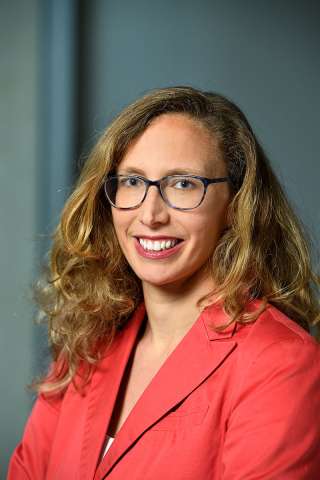
Q&A: Elizabeth Boyle
March 26, 2019
Bloomberg Fellow Elizabeth Boyle has been an environmental health advocate from way back. As a middle school student in Springfield, Ohio, in the early 1990s, at lunchtime she watched with concern as other students tossed empty beverage cans into the trash. She knew there was a better way than sending all that aluminum to landfills, so she worked with the custodians to set up a place for students to toss their cans. Once a month, Elizabeth and her mother shuttled a batch of cans to a recycling center outside of town — initiating her school’s first recycling program.
Elizabeth went on to graduate from Xavier University with degrees in biology and environmental studies and to earn her master’s in environmental health and infectious diseases at the University of Minnesota. Today, she is a program officer at the National Academies of Sciences, Engineering and Medicine. This group of private nonprofit institutions in Washington guides decision makers on best policies and practices in science, engineering and health. Elizabeth, who is also pursuing a doctorate at Johns Hopkins Bloomberg School of Public Health, convenes committees of experts and supports them as they develop cohesive, comprehensive reports on pressing health issues.
We talked to Elizabeth about how she brings experts together, a study she directed that saved a federal environmental protection program and the consequences of efforts to politicize science.
What do you take into consideration when selecting experts for a new committee?
We focus on identifying people with the right expertise and an appropriate balance of views. We also want diversity in race, ethnicity, discipline and geography in our panels. We try to include people in different stages of their careers as another layer of diversity. People at later stages in their careers often have very decided, well-formed perspectives on their topics, so having junior researchers interact with them results in rich conversation.
Tell us about a project you’ve worked on.
The first study I directed was a review of the Environmental Protection Agency’s extramural research and fellowship program, known as the Science to Achieve Results, or STAR, program. I was forming a committee of experts to develop a consensus study on the program’s value. The report was published in June 2017 and concluded that STAR was important for protecting the environment and public health. When the report was released, it got a lot of attention because the Trump administration was planning to defund the program in proposed budget cuts. The report was even covered by the Washington Post. And for what it’s worth, the program still exists at EPA.
There’s an “attack” on science often discussed in media and politics these days. How does that impact your work?
It’s making it more difficult — and more important — to maintain our objectivity and non-partisanship. We’re steering conversations among experts with a range of views towards consensus, and polarizing our topics makes it harder to do that. In other ways, it gives more value to our institution because we are known to value neutrality and create a safe space for different perspectives to be heard.
What have you been able to take away from your coursework so far?
As a DrPH student, I have been taking fundamental public health courses like biostatistics and epidemiology. Being able to deepen those skills in an educational setting has been really helpful. I also took a series of problem-solving courses across the different problem areas, such as the opioid crisis and antibiotic resistance. Learning about the different tools used in each of these areas to conceptualize and think about issues has brought a certain richness to my thinking.
Connect With Us
Receive all the latest news from the Initiative by signing up for the American Health Dispatch newsletter, subscribing to the American Health Podcast, and subscribing to our YouTube channel.
Contact Us